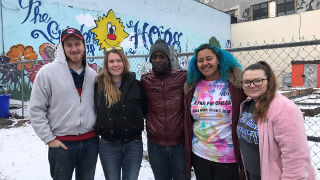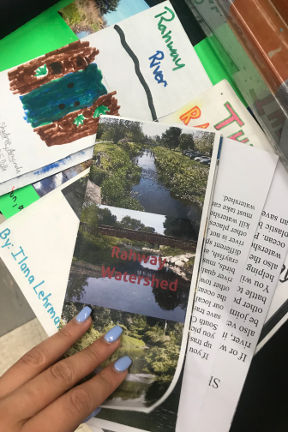Educating the Next Generation of Environmental Reformers - Seton Hall University
Thursday, April 26, 2018
Senior environmental studies capstone students are partnering with organizations statewide to create educational materials that can be used in various schools, organizations, and communities. Each project is focused on educating others about the importance of protecting and nurturing the environment.
According to Marian Glenn, co-professor of the capstone class, "Environmental Studies draws on many academic disciplines, and this broad spectrum of knowledge makes it a good major for aspiring elementary and middle school teachers. About half of the students who are majoring in environmental studies are also in the College of Education."
"New technologies are expanding our view of the Earth and revealing effects of human activities that are profoundly changing the nature of our planet. A new generation of students are challenged to practice ecological restoration to lighten the footprint of human activity on the environment. Resolving the crisis of our environment is a challenge that draws on the endeavors of all the disciplines, working together."
Inspired by Earth Day on April 23, this story is the last in a three-week series and highlights the research for and creation of materials that environmental organizations will be able to use to provide enhanced educational opportunities.
Informing our Children

Learn more about the work they are doing on their blog: https://newarkseniorcapstone.weebly.com/
Benefitting New Communities

Additionally, Hunt is also working on research of an African Diaspora community in Chester, Pennsylvania. The community is struggling with poverty, disease, and other systemic issues, as well as combating being a food desert. Hunt is guiding the community's venture to launch agricultural projects focused on growing life-saving medicines without needing pharmacies, which are hard to come by in their rural area.
To learn more about her research, visit her blog here: https://gabihunttransitionmovement.wordpress.com/
Creating Hands-On Learning for Students
Tammy Quach and Joshua Morenos are working with the New Jersey Watershed Association
to create a curriculum that will be implemented in middle school classrooms. They
are working specifically with South Orange Middle School to help improve their existing
curriculum. Seventh grade students will learn about the importance of preserving and
restoring the ecosystem and will be able to put this learning into practice with hands-on
projects.
The seventh graders have been connected with the Rahway River Watershed and will take part in River Day 2018 by helping to clean up the river. By the end of the semester, Quach and Morenos expect to have a completed River Curriculum Guidebook with lessons, activities, and other resources for teachers to use in the classroom.
Protecting the Birds
Kelly Price is working with the Raptor Trust. She has assisted them in developing new educational materials about the birds, their diets and nests, and information regarding causes of death among the birds and ways to prevent them. She is also assisting with administrative tasks including tracking donations. The educational materials Price has created will be used with groups of children that visit the birds to help them learn facts about them and ways they can help preserve the environment for them.
For more information about her work with the Raptor Trust, visit her blog here: https://pricekelcapstone.weebly.com/.






